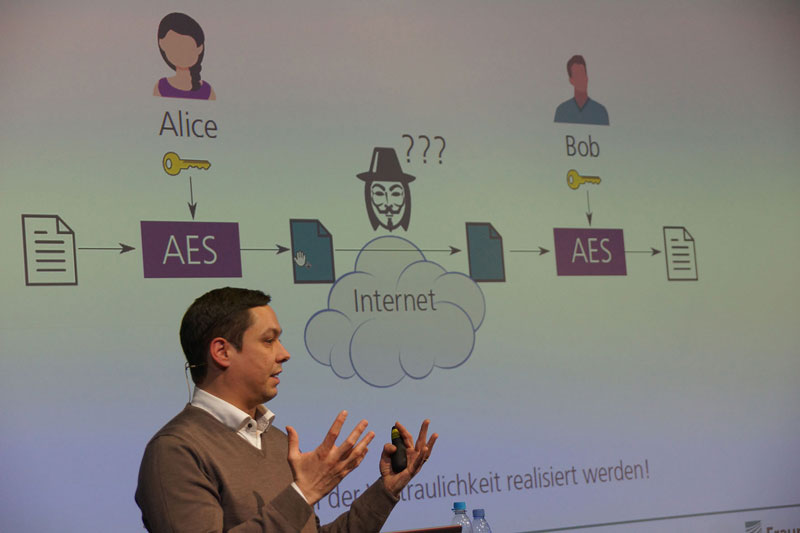by Vivija Simić and Barbora Hrdá (Fraunhofer AISEC)
The demand for qualified professionals with knowledge in quantum computing is increasing as the technology matures. New courses of study and continuing education offerings are more important than ever. To quickly meet this demand, Fraunhofer is working on a high-quality continuing education program in consultation with industry with the first successfully implemented training courses already in place.
Entering the world of quantum computing is complex. Unless you are studying physics, you generally have just a few points of contact with this branch of research. But the demand for specialists in scientific and industrial sectors is growing as challenges await us that we cannot yet solve [1].
One of the main challenge that quantum computing brings with it is that powerful enough quantum computers are expected to break many of today’s standard IT security procedures, mainly asymmetric cryptographic methods such as asymmetric encryption or digital signatures. Just imagine that all underlying security measures of our IT systems are undermined from one day to the next: Hackers have access to virtually every networked information system and can manipulate data at their own discretion. The consequences of such a scenario, such as the access to and use of valuable data, are dramatic and must be prevented in the future by quantum computing experts.
Most encryption algorithms used today are based on problems which, without the information deliberately kept secret, cannot be solved by a classical computer, or only with a disproportionately large amount of effort. This principle forms the basis of the modern communication society. If, however, a large quantum computer can be constructed, many of these processes will be vulnerable and the security countermeasures we are using today would not be sufficient anymore.
Quantum resistance: be prepared already today
The solution to this problem is to evaluate the hazard situation and introduce quantum resistant methods already today by assessing the threat situation and introducing quantum resistant processes. Particularly in areas with a long deployment period, such as critical infrastructures, high security areas or official deployment scenarios, it is important to be aware of the possible threat situation in the future, in order to be able to take proactive measures today.
In order to adequately analyze the threat situation, experts in this field are needed transferring the knowledge into industrial applications by networking and exchanging information with each other.
But where can we find these experts? How can we build up the required expertise in a timely manner?
Although numerous study programs in the field of Quantum Technologies on Bachelor’s and Master’s level have been launched in Germany and Europe, the need for continuing education programs is still high to react quickly to the demand arising: on the one hand to ensure further training for junior staff, on the other hand transferring knowledge to professionals who are already firmly established in their careers. At Fraunhofer there are already initial efforts in this direction and concrete training offers, such as the Post-Quantum Security course by Prof. Dr. Daniel Loebenberger.
This course addresses in the first section the functionality of quantum computers. It then explains and evaluates new types of algorithms for the post-quantum era. This training is part of the planned curriculum on quantum computing and quantum technologies at Fraunhofer.

Prof. Dr. Daniel Loebenberger is specialised in Post-Quantum Security (© Fraunhofer).
Fraunhofer formed the Quantum Computing Education Team
In order to ensure the quality of trainings offered, as well as covering a wide variety of topics, a consortium of various Fraunhofer Institutes, called Quantum Computing Education Team, has been formed, bringing together experts from different domains such as (financial) mathematics, machine learning, IT security, but also didactics and media.
This group of applied researchers work together with experts from different industry domains to create a demand-oriented continuing education offering combining both scientific standards and industrial needs. The goal of this initiative is to successfully shape a crucial future technology with quantum computing. An important prerequisite for this is the early development of specialist skills.
What distinguishes this working group from already available offers is on the one hand the concentrated expertise from different research areas and industrial domains and on the other hand the access to exclusive resources. The availability of quantum computers for research and education is often a bottleneck. But here Fraunhofer, together with IBM, has exclusive access to IBM System One, which is not only available for research, but also for training.
Fraunhofer has set itself the goal of creating a broad, comprehensive and practical training program in various domains influenced by quantum computing, similar to the well-established Cybersecurity Training Lab, in order to actively counteract the future shortage of specialists in quantum technologies at an early stage.
Links:
[L1] Course Post Quantum Security: https://kwz.me/h92
[L2] Quantencomputing Education im Überblick: https://kwz.me/h95 (only in German)
[L3] Lernlabor Cybersicherheit am Fraunhofer AISEC: https://kwz.me/h96 (only in German)
Reference:
[1] Quantum technologies – from basic research to market - A Federal Government Framework Programme, https://kwz.me/h97, accessed: November 5th, 2021)
Please contact:
Vivija Simić
Project Manager Cybersecurity Training Lab
Fraunhofer Institute for Applied and Integrated Security AISEC, Germany
Barbora Hrdá
Scientific Researcher
Fraunhofer Institute for Applied and Integrated Security AISEC, Germany











